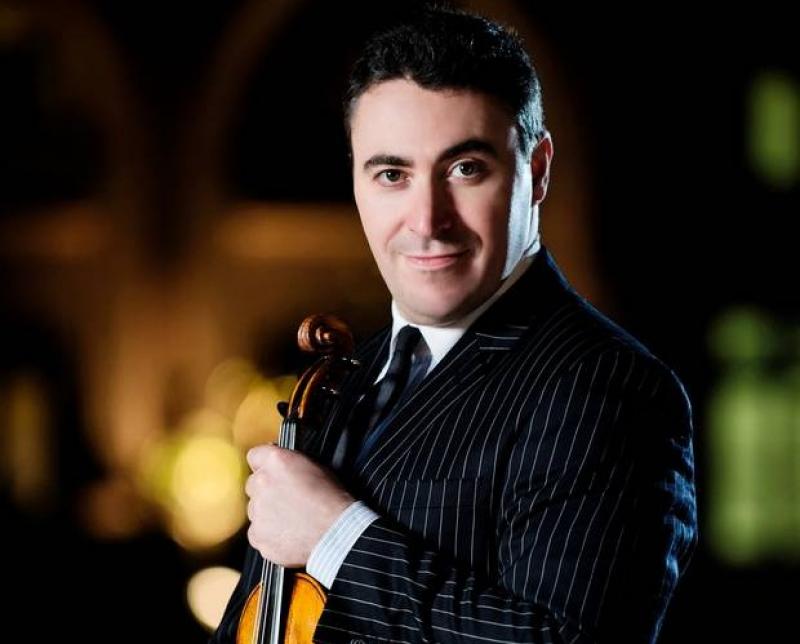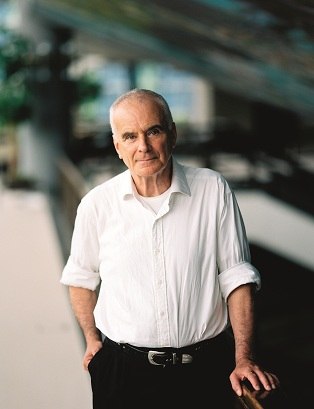Vengerov, LSO, Pappano, Barbican | reviews, news & interviews
Vengerov, LSO, Pappano, Barbican
Vengerov, LSO, Pappano, Barbican
Orchestra on thrilling form for three British works including a world premiere

An all-British programme – with plenty of Italian flavours – opened to a sold-out Barbican Hall with the overture In the South (Alassio), composed by Elgar during a stay on the Italian Riviera. It isn’t one of his most memorable scores, but it still provides plenty of interest with typical Elgarian exuberance, an unexpected martial episode (imagining the Roman army), and a muted viola solo.
Maxim Vengerov’s commanding performance of the Britten concerto came next. There have perhaps been more angst-ridden readings of this work, with the Russian virtuoso true to form emphasising the lyrical elements. However, he certainly didn’t shy away from jagged intensity when the score demanded it, and his second movement was sprightly and light of touch. It is over a decade now since his much praised recording of the concerto for EMI which marked his first engagement with the work. It is clear that the intervening years have only deepened his respect for this bona fide masterpiece. The mature Vengerov may be a more reserved stage presence than the flashy swaggerer of old, but the energy is still there in the music, and the sheer technical mastery undiminished.
Pappano’s experience in the opera pit and as a piano accompanist was in evidence in his sensitive conducting, ever attentive to the soloist, allowing Vengerov to lead and the music to breathe. The audience was clearly angling for an encore as the applause continued and drew the violinist out for a fourth curtain call, but it was not to be. I very much doubt anyone felt short-changed.
 After the interval, the opening strains of the world premiere performance of Peter Maxwell Davies’s 10th symphony formed an unexpectedly smooth transition from the Britten still ringing in our ears. Though later dipping into spikily atonal areas, this new work mostly gravitates to tonal centres and offers a broadly accessible sound world, richly scored with extended woodwind and tuned percussion sections. Burbling marimba chords and the subterranean purr of contrabass clarinet proved particularly memorable touches, while the clang of hard mallets on tubular bells and vibes depicting the sound of construction were absolutely central to the work’s purpose – a tribute to architect of the Italian baroque Francesco Borromini.
After the interval, the opening strains of the world premiere performance of Peter Maxwell Davies’s 10th symphony formed an unexpectedly smooth transition from the Britten still ringing in our ears. Though later dipping into spikily atonal areas, this new work mostly gravitates to tonal centres and offers a broadly accessible sound world, richly scored with extended woodwind and tuned percussion sections. Burbling marimba chords and the subterranean purr of contrabass clarinet proved particularly memorable touches, while the clang of hard mallets on tubular bells and vibes depicting the sound of construction were absolutely central to the work’s purpose – a tribute to architect of the Italian baroque Francesco Borromini.
To this end, as well as the musical invocation of building work, Davies has set a collection of texts about and by Borromini, sung by choir and baritone (the finely drilled London Symphony Chorus and Markus Butter). The texts themselves are fascinating, ranging from a contemporary satirical sonnet deriding the architect’s work (in the first movement) to an extraordinary "sick note" written by Borromini on his deathbed, matter-of-factly describing his suicide attempt and apologising for being absent from his duties. The Sprechgesang of the baritone soloist, interspersed with the choir intoning the names of Borromini churches, brought the work to a close, with the orchestra dropping out and the choir fading out on a low hum. Pappano and the LSO shone in a very well rehearsed performance of this substantial and complex new work.
rating
Explore topics
Share this article
The future of Arts Journalism
You can stop theartsdesk.com closing!
We urgently need financing to survive. Our fundraising drive has thus far raised £49,000 but we need to reach £100,000 or we will be forced to close. Please contribute here: https://gofund.me/c3f6033d
And if you can forward this information to anyone who might assist, we’d be grateful.

Subscribe to theartsdesk.com
Thank you for continuing to read our work on theartsdesk.com. For unlimited access to every article in its entirety, including our archive of more than 15,000 pieces, we're asking for £5 per month or £40 per year. We feel it's a very good deal, and hope you do too.
To take a subscription now simply click here.
And if you're looking for that extra gift for a friend or family member, why not treat them to a theartsdesk.com gift subscription?
more Classical music
 Goldscheider, Brother Tree Sound, Kings Place review - music of hope from a young composer
Unusual combination of horn, strings and electronics makes for some intriguing listening
Goldscheider, Brother Tree Sound, Kings Place review - music of hope from a young composer
Unusual combination of horn, strings and electronics makes for some intriguing listening
 theartsdesk Q&A: composer Donghoon Shin on his new concerto for pianist Seong-Jin Cho
Classical music makes its debut at London's K-Music Festival
theartsdesk Q&A: composer Donghoon Shin on his new concerto for pianist Seong-Jin Cho
Classical music makes its debut at London's K-Music Festival
 Helleur-Simcock, Hallé, Wong, Bridgewater Hall, Manchester review - moving lyricism in Elgar’s concerto
Season opener brings lyrical beauty, crisp confidence and a proper Romantic wallow
Helleur-Simcock, Hallé, Wong, Bridgewater Hall, Manchester review - moving lyricism in Elgar’s concerto
Season opener brings lyrical beauty, crisp confidence and a proper Romantic wallow
 Kohout, Spence, Braun, Manchester Camerata, Huth, RNCM, Manchester review - joy, insight, imagination and unanimity
Celebration of the past with stars of the future at the Royal Northern College
Kohout, Spence, Braun, Manchester Camerata, Huth, RNCM, Manchester review - joy, insight, imagination and unanimity
Celebration of the past with stars of the future at the Royal Northern College
 Jansen, LSO, Pappano, Barbican review - profound and bracing emotional workouts
Great soloist, conductor and orchestra take Britten and Shostakovich to the edge
Jansen, LSO, Pappano, Barbican review - profound and bracing emotional workouts
Great soloist, conductor and orchestra take Britten and Shostakovich to the edge
 Jakub Hrůša and Friends in Concert, Royal Opera review - fleshcreep in two uneven halves
Bartók kept short, and a sprawling Dvořák choral ballad done as well as it could be
Jakub Hrůša and Friends in Concert, Royal Opera review - fleshcreep in two uneven halves
Bartók kept short, and a sprawling Dvořák choral ballad done as well as it could be
 Hadelich, BBC Philharmonic, Storgårds, Bridgewater Hall, Manchester review - youth, fate and pain
Prokofiev in the hands of a fine violinist has surely never sounded better
Hadelich, BBC Philharmonic, Storgårds, Bridgewater Hall, Manchester review - youth, fate and pain
Prokofiev in the hands of a fine violinist has surely never sounded better
 Monteverdi Choir, ORR, Heras-Casado, St Martin-in-the-Fields review - flames of joy and sorrow
First-rate soloists, choir and orchestra unite in a blazing Mozart Requiem
Monteverdi Choir, ORR, Heras-Casado, St Martin-in-the-Fields review - flames of joy and sorrow
First-rate soloists, choir and orchestra unite in a blazing Mozart Requiem
 Cho, LSO, Pappano, Barbican review - finely-focused stormy weather
Chameleonic Seong-Jin Cho is a match for the fine-tuning of the LSO’s Chief Conductor
Cho, LSO, Pappano, Barbican review - finely-focused stormy weather
Chameleonic Seong-Jin Cho is a match for the fine-tuning of the LSO’s Chief Conductor
 Classical CDs: Shrouds, silhouettes and superstition
Cello concertos, choral collections and a stunning tribute to a contemporary giant
Classical CDs: Shrouds, silhouettes and superstition
Cello concertos, choral collections and a stunning tribute to a contemporary giant
 Appl, Levickis, Wigmore Hall review - fun to the fore in cabaret and show songs
A relaxed evening of light-hearted fare, with the accordion offering unusual colours
Appl, Levickis, Wigmore Hall review - fun to the fore in cabaret and show songs
A relaxed evening of light-hearted fare, with the accordion offering unusual colours
 Lammermuir Festival 2025, Part 2 review - from the soaringly sublime to the zoologically ridiculous
Bigger than ever, and the quality remains astonishingly high
Lammermuir Festival 2025, Part 2 review - from the soaringly sublime to the zoologically ridiculous
Bigger than ever, and the quality remains astonishingly high

Add comment